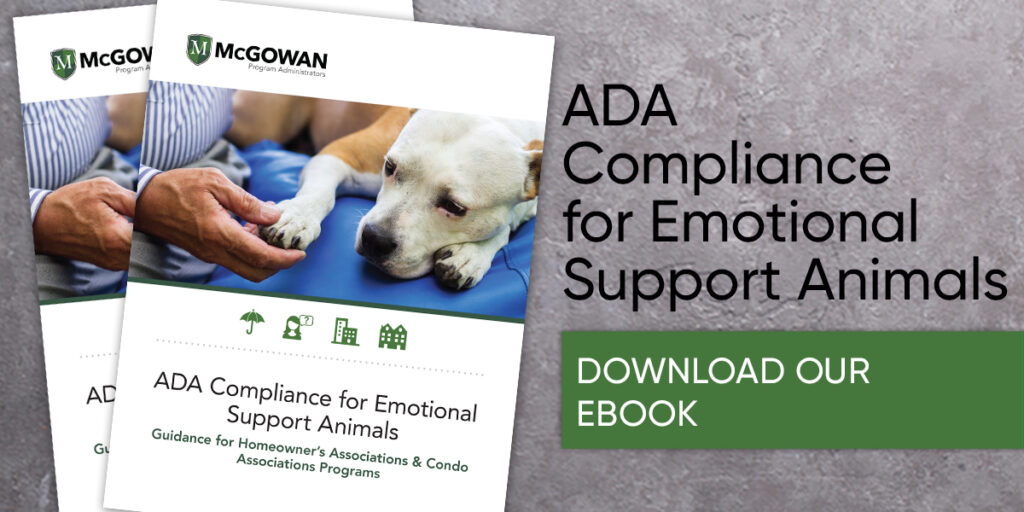For millions of Americans, an emotional support animal is more than just a pet. They are companions that guide owners through the rough waters of stress and anxiety. However, the estimated 350,000 community associations nationwide should be aware of the rules that regulate these helpful companions. These regulations are and continue to be a trap for the unwary.
To be considered an emotional support animal (ESA) under modern housing laws, the need for an ESA must first be certified. This is done through a physician, psychiatrist, social worker, or other mental health care professional. The Americans with Disabilities Act (ADA) defines an ESA as “any animal that provides emotional support alleviating one or more symptoms or effects of a person’s disability. Emotional support animals provide companionship, relieve loneliness, and sometimes help with disabilities.”
ESAs differ from service animals as are strictly defined and regulated by the ADA. Specifically, ESAs are not required to undergo special training to perform a specific function for their owners such as a Seeing Eye dog, hearing assistance dogs, dogs monitoring an individual’s blood sugar, or potential epileptic seizures. While service animals are fully protected under the ADA—a designation that allows them full access to restaurants, malls, and more—ESAs do not enjoy the same privilege. The rights to maintain ESAs have been reigned in significantly over the past few years due to significant abuse by individuals trying to have a loving pet designated as an ESA.
This has been a significant issue for the community associations and has unnecessarily led to unnecessary claims and lawsuits against community associations and their volunteer boards who were not schooled in the relevant regulations. ESAs are covered by the Fair Housing Act of 1968 (FHA), which prohibits disability-based discrimination against people seeking housing. In February 2021, the Department of Housing and Urban Development (HUD) filed a discrimination charge against a Missouri landlord for requiring a would-be tenant to pay a pet deposit for her emotional support animal. Such are the hurdles ESA owners must overcome when navigating a society that may not completely understand their needs.
Also read: The Risks of Aging Infrastructures for Community Associations
Emotional support animals are protected under housing law in most circumstances
Individuals with ESAs must get professional certification proving their animal alleviates one or more symptoms of an existing emotional or psychiatric disability. These can include anxiety, depression, and attention deficit disorder, but that person is not obligated to reveal specifics upon certification.
Professionally certified emotional support animals have unrestricted access to housing, even properties with no-pet policies. According to the FHA, people with disabilities can request reasonable accommodations from their homeowner’s association (HOA), including the right to have an emotional support animal. Considering the FHA supersedes most pet-related regulations, neither HOAs nor condo associations (CAs) can refuse a legitimate request for an emotional support animal.
One of the key pitfalls of association voluntary boards is that they often do not believe the applicant seeking an accommodation. Often boards who have been provided the requisite medical certification supporting the need of an ESA, request additional medical information and/or seek to interview the applicant. These additional requests are not permitted in the normal course and often leads to an avoidable claim and possible litigation, or an investigation by an administrative body such as state civil rights commissions. At a minimum demanding such additional information should not be considered without advice of legal counsel.

The many benefits of emotional support animals
ESAs do not need specialized training like a Service Animal to obtain classification, although they can be trained to remind an individual with mental illness to take their medication. In fact, an ESA requires no special training. Also referred to as therapy animals, their service alleviates disability symptoms or effects for their owner. Even their presence alone can deliver a stabilizing effect for owners with mental conditions. Even though they do not require training, they are subject to other reasonable pet restrictions such as certain breeds, safety to other association members and excessive nuisances such as barking.
Doctors sometimes prescribe an ESA for patients on the advice of ongoing research into the topic. Some of this research suggests people are more relaxed, less anxious, and less lonely when holding or petting an animal. The ongoing pandemic has exacerbated mental health issues for many Americans, making the need for regular companionship all the more crucial. A corresponding uncharted issue is what happens when and if the pandemic is substantially ended and people may not need such any ESAs going forward. We are sure that will give rise to a whole new level of challenges.
Focusing on an animal companion also helps people feel independent, a vital facet of strong mental health. However, housing communities and private properties exist outside ADA jurisdiction. Therefore, people seeking an uplifting boost from a furry friend should refer to rules set forth by the FHA.
Also read: HOA Community Pools: Understanding D&O Insurance Coverage
Pet owners should have their documents ready
Although HOAs cannot excessively restrict ESAs, they do have the right to ask for supporting documentation. To that end, owners should keep handy proof of disability benefits or a therapist-supplied ESA verification. It is highly recommended that community association owners acquiring an ESA be proactive and request the accommodation and not wait for a board to seek the necessary documentation it is entitled to from the owner. Failure to be proactive only leads to acrimony amongst other owners who are forced to speculate why a person in a no pet community acquires what appears to be a pet.
HOAs cannot ask specific questions about a person’s disability during the application process. This prohibition also encompasses questions about medication and other mental health topics. For HOAs, developing a detailed policy or resolution regarding ESAs is a solid starting point. Associations should work with an attorney to ensure the legality of any such policy, making the process easier for all involved and protecting against future litigation.
Also read: Simple Ways to Avoid Community Association Lawsuits
Emotional support animal housing rules: need-to-know for pet owners and HOAs alike
Emotional support animals may not be as well-trained as service animals, so housing administrators have the right to require owners to follow certain rules. Though leash regulations, waste clean-up, and noise restrictions are reasonable requests, HOAs cannot charge extra fees to allow ESAs into the community. Nor can HOAs impose breed, size, or weight limits on ESAs.
These helpful pets are allowed on all premises, including communal areas such as clubhouses, parks, or pools. Owners will need to pay for any damages caused by their animals, while ESAs that pose a safety risk can be denied by an HOA. In rare circumstances, associations finding evidence that a resident lacks a disability requiring a support animal can deny the request.
Ultimately, the benefit of an ESA comes with responsibility for both their owners and the housing associations they interact with.
Contact us for more information on emotional support animal regulations and housing laws.


